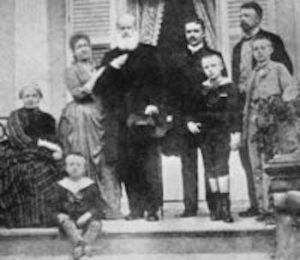
Portuguese royal family
On this date, in 1888, Brazil abolished slavery.
During the 19th century, Europe exported two dynasties across the Atlantic to America. The Portuguese royal family in Brazil was established during Napoleonic times. Fearing Napoleon's onslaught, the family left Lisbon and moved the court to Brazil, the Crown's most prized possession.
The Portuguese royal contingent arrived on the coasts of Brazil on January 21, 1808. The peaceful existence of the Brazilian imperial family ended in the late 1880s. Although initially a conservative ruler, Pedro II eventually recognized the inherent unfairness of the slavery system, which affected millions of his subjects. Part of this rationale was the human aftereffects of the Treaty of Tordesillas.
Pedro gradually passed laws that liberated his subjects. By the late 1880s, it was just a matter of time before the emperor abolished slavery in Brazil. Unfortunately for the Crown, Brazilian landowners and the country's military leadership were not keen on the liberalizing policies of Pedro II. The abolition of slavery subjected landowners to higher capital investment in the workforce. Since these conservative groups were the mainstay of the military, the armed forces were predisposed to side with the land-owning classes. Dom Pedro was traveling in Europe when Princess Isabel (shown 3rd from left, standing), acting as regent in her father's stead, passed a law abolishing slavery in Brazil on May 13, 1888.
This law, commonly known as the Golden Law, brought international praise to the Brazilian imperial family and condemned the Crown. The landowners quickly organized and built opposition to the monarchy. Revolts broke out in different regions of the country. In many instances, Brazil's republican neighbors, countries that had always resisted having an emperor in Latin America, helped these revolts. Princess Imperial Isabel's decree eventually led to the proclamation of the Brazilian Republic on November 16, 1889. But in the centuries since, forced labor has survived here.
Most forced labor takes place on large estates called Fazendas. In its present-day version, slavery begins with labor contractors called Gatos or Cats. They lure uneducated workers, mainly from the Northeast, with the promise of decent wages. Once the laborers arrive, however, they find they have already run up unpayable debts to their employers for food, medicine, lodging, and even tools. In many cases, they work long hours in the hot sun in exchange for food or wages as low as 10 cents an hour. Armed guards patrol work areas to ensure nobody escapes until debts are paid.
Even more than in the U.S., slavery in Brazil created a vast lower class and extreme inequalities. According to the World Bank, 40.9 percent of Brazil's 155 million inhabitants live below the poverty line, and the richest 10 percent own more than half the nation's wealth. No slave owner has been successfully prosecuted for violating the law that bans enslavement.
Human rights workers say local police and judges have conspired with slave owners. A church worker who condemned a federal congressman for owning slaves in 1992 was convicted of slander and sentenced to a year in jail, a punishment later suspended.
The African American Desk Reference
Schomburg Center for Research in Black Culture
Copyright 1999 The Stonesong Press Inc. and
The New York Public Library, John Wiley & Sons, Inc. Pub.
ISBN 0-471-23924-0